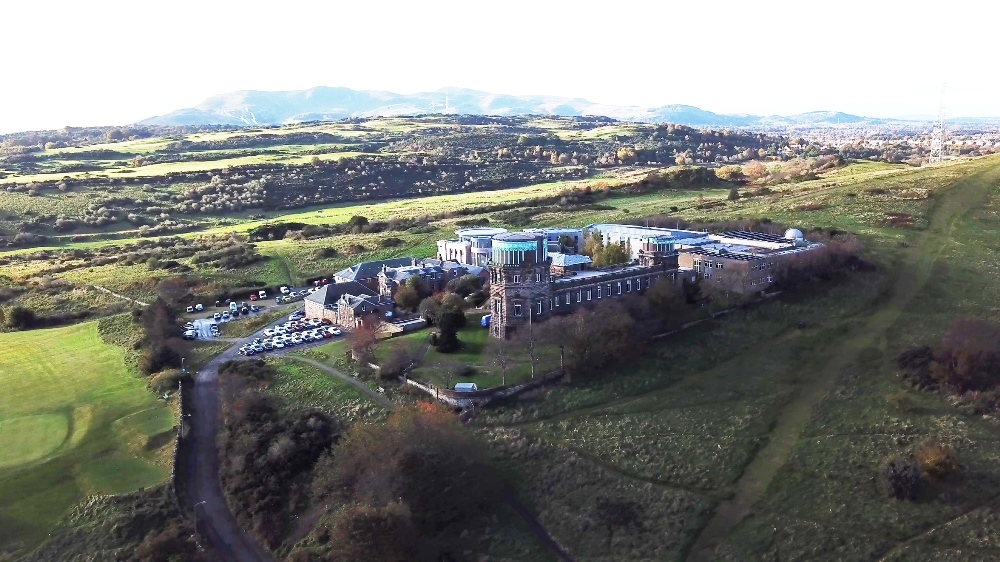UK funding boosts international space projects

Image courtesy UK Space Agency
The UK Space Agency’s International Bilateral Fund is focused on supporting the UK space sector to work directly with international partners on exciting and innovative projects. It is funding, amongst others, the University of Strathclyde to work with organisations including MIT and the Alan Turing Institute to use Artificial Intelligence to improve space operations, safety and sustainability.
Vertical Future is developing a robotic ‘space farm’ facility to grow plants in space, and Rolls-Royce is working with US company BWXT on space nuclear power.
From developing new technology for high-resolution photos of the Moon and Mars, to X-ray imaging that will help scientists study the Earth’s Aurora in unprecedented detail, the 11 projects showcase valuable missions and capabilities and highlight the breadth of expertise found across the UK’s vibrant space sector which employs around 49,000 people.
The £13 million funding boost was announced on the opening day of the 39th Space Symposium in Colorado Springs (Monday 8th April).
Space Minister at DSIT, Andrew Griffith MP, said: "The UK is home to some of the brightest minds in space science, aerospace engineering and an entrepreneurial commercial space sector. It’s no wonder the world wants to collaborate with Britain when it comes to space.
"I am delighted that today we have been able to support new space collaborations with private organisations from countries like the US, Australia, Canada, India and Singapore."
This is the second phase of investment awarded through the UK Space Agency’s £20 million International Bilateral Fund, following the first phase in August 2023. Phase 1 funded 32 projects up to £75,000 each, all of whom entered into a highly competitive process for further funding from Phase 2.
Dr Paul Bate, Chief Executive of the UK Space Agency, said: "We want to draw on the best global talent to push the boundaries of new technology such as AI and space nuclear power, enhance our homegrown space capabilities and catalyse investment into the UK economy.
"The projects supported by our International Bilateral Fund champion the best of British innovation, while strengthening our ties with the wider space community. Together we can break new ground, further our understanding of the Universe and use the vast power of space to protect and benefit lives on Earth."
As further evidence of the success of the UK-Australia Space Bridge, the International Bilateral Fund has been bolstered by a co-funding commitment from the Australian Space Agency, worth AUS$3 million.
Projects supported by Australia include Aquawatch-AUK, led by Surrey Satellite Technology Ltd (SSTL), which is using disruptive space technologies to develop a world class integrated water quality monitoring and forecasting system for use across the UK, Australia and beyond.
Head of the Australian Space Agency Enrico Palermo said: "This funding builds on the collaboration fostered through the UK-Australia Space Bridge. By working with our international partners like the UK, we can continue to grow the Australian space sector while delivering outcomes that benefit communities in both of our nations.
"From addressing food security and water scarcity to the health of our waterways, the projects being supported through this fund reiterate how space can help address the biggest global challenges we are facing – as well as the power of working together to solve a common problem."
Space Symposium runs from 8th-11th April in Colorado Springs and brings together over 10,000 people from the global space industry. The UK’s growing space sector is represented at the event by organisations including the UK Space Agency, UK Research & Innovation (UKRI), various government departments, companies and universities.
UKspace Director, Lizzie Kerr, said: "It is great news that so many of our members and partner organisations across the UK have been successful in this round of funding. Given space is inherently a global endeavour, the International Bilateral Fund investment will support and strengthen international collaborations between UK industry and research partners and their counterparts across the world.
"Following the original IBF announcement at the 38th Space Symposium, we are really encouraged by the positive progress made during the past 12 months. UKspace will be at the 39th Space Symposium and we are keen to explore how we can help foster new collaborative partnerships with trade associations around the world."
Phase 2 Projects (with approx. Phase 2 grant allocation figures only)
Rolls-Royce Submarines Limited (UK) and partners BWXT Advanced Technologies LLC (USA) - £1,200,000
Project to identify the optimum technologies for a fission nuclear system which balances flexibility to a range of space power missions and maximises performance whilst minimising programme and technical risk.
University of Leicester (UK) and partners from the UK, USA and Japan - £800,000
Project to identify a range of mission opportunities for UK space nuclear power technologies. The collaboration also includes the development of hybrid power systems with existing US conversion technologies.
Vertical Future Ltd (UK) and partners University of Cambridge (UK), University of Adelaide (Australia), University of Western Australia (Australia)(UWA), University of Southern Queensland (Australia), Axiom Space (USA), Saber Astronautics (USA/ Australia), South Australian Space Industry Centre (Australia) - £1,500,000
Development of a state-of-the-art, autonomous, controlled environmental agriculture facility for optimal plant growth in space to support both missions and experimentation. It will adapt learnings from current and future experiments on the International Space Station to ensure feasibility.
XCAM Ltd (UK) and partners The Open University (UK), University College London (UK), Teledyne UK Ltd (UK) and the Indian Space Research Organisation (India) - £500,000
Development of a new X-ray imaging instrument, AXIS, targeted at studying the X-ray emission from Earth’s aurorae. The project arises from the European Space Agency’s Theseus programme and represent the first demonstration of this new technology in a space mission.
Surrey Satellite Technologies Ltd (UK) and partners Assimila (UK), RAL Space (UK), Pixalytics (UK), Centre for Environment, Fisheries and Aquaculture Science (UK), Commonwealth Scientific and Industrial Research Organisation (Australia), SmartSat CRC (Australia), Airbus in Asia Pacific (Australia) - £1,000,000
Developing a system of actionable information on inland and coastal water quality. It will bring together space and water experts to develop an innovative approach to assess and predict water quality and its impacts on ecosystems while providing a pathway to a strategic sharing of a satellite solution between the UK and Australia.
In-Space Missions Ltd (UK) and partners Taiwan Space Agency (Taiwan), National Tsing Hua University (Taiwan), Philippine Space Agency (Philippines), The Geo-Informatics and Space Technology Development Agency (Thailand), Office for Space Technology and Industry (Singapore), A*STAR Research Entities, Institute for Infocomm Research (Singapore), Oxford Space Systems (UK), National University of Singapore (Singapore), Addvalue (Singapore), Vietnam National Space Centre (Vietnam) - £1,500,000
The Faraday Dragon Rideshare Mission – a multi-agency collaboration to accelerate space technology and business via payload development. It brings together emerging space-based organisations from Singapore, Taiwan, Philippines, Thailand and Vietnam and the UK.
Iota Technology Ltd (UK) and partners STFC RAL Space (UK), Oxford Space Systems Ltd (UK) and Twinleaf LLC (USA), - £1,500,000
High-accuracy nanosatellite magnetometry which will form the primary payload of the Io-1 CubeSat. It will raise the atomic magnetometer, fluxgate magnetometer and deployable boom’s technical readiness level and capture data in support of the World Magnetic Model.
University of Strathclyde (UK) and partners University of Arizona (USA), Massachusetts Institute of Technology (USA), University of Waterloo (Canada), Columbiad Launch Services (Canada), GMV UK, LIFT ME OFF Ltd, The Alan Turing Institute (ATI), Nominal Systems (Australia) - £1,500,000
Escalating the technology readiness of AI technology applied to space safety and sustainability, from concept to adoption by the space sector. It will lay the foundations for an international virtual institute supporting the future development of AI technology for space sustainability.
University of Southampton (UK) and partners University of Michigan (USA), Airbus Defence and Space UK), Pulsar Fusion UK and Starlight Engines (USA) - £1,000,000
Development of the capabilities of Hall thruster research and commercial development in the UK. The project will improve the UK’s capabilities in an absolutely intrinsic field of spacecraft technology.
The Open University (UK) and partners Lunar and Planetary Laboratory, University of Arizona (USA), Ball Aerospace and Technologies (USA), XCAM Ltd (UK) and Teledyne e2v (UK) - £1,300,000
The development of the next generation of ultra-high resolution imaging instruments, the Teledyne e2v CIS 125 detector. It will support US space agency Moon and Mars science and exploration objectives.
University of Leicester (UK) and partners Geospatial Insight Ltd (UK), Bahrain National Space Science Agency (Bahrain), Industry and Energy Division, YBA Kanoo Group (Bahrain) - £1,400,000
Development of a new capability to enable monitoring of greenhouse gas emissions in the Gulf region from a small spacecraft. The project will evolve the state of the art in sensing for compact and targeted deployments.













